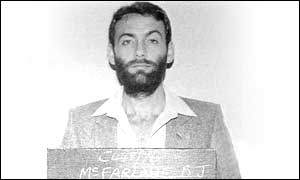British ‘had no intention of resolving the hunger strike’
Brian Rowan reports
Belfast Telegraph, Thursday, 4 June 2009
The IRA jail leader during the 1981 hunger strike today said the British Government never had any intention of resolving the notorious prison dispute in which 10 men starved to death.
Brendan ‘Bic’ McFarlane accused the then Thatcher Government of trying to resolve the prison protest “on their terms” while attempting to “wreck” the IRA in the process.
McFarlane, speaking in an exclusive interview for the Belfast Telegraph, again dismissed claims that he accepted an offer secretly communicated by the British that summer, but was overruled by the Army Council on the outside.
The suggestion first emerged in the controversial book Blanketmen — written by former prisoner Richard O’Rawe, who was part of the IRA jail leadership in 1981.
A British offer on the prisoners’ demands was communicated in the summer of that year through a secret contact channel which was codenamed Mountain Climber.
And, on Sunday, July 5, the senior republican Danny Morrison was allowed into the Maze to separately brief McFarlane and the hunger strikers.
“Something was going down,” McFarlane said.
“And I said to Richard (O’Rawe) this is amazing, this is a huge opportunity and I feel there’s a potential here (in the Mountain Climber process) to end this.”
But he said he also made clear that more was needed — that the British had to “expand the offer, and they need to go into the prison hospital”.
McFarlane said this was key — that the Government detail its offer directly to the hunger strikers.
“They (the hunger strikers) were at pains to say the Brits need to come forward,” he said.
“They need to expand on it (the offer),” he continued, “and stand over it and it needed to be underwritten in whatever shape, form or fashion the British chose to do that. It needed to be confirmed,” he said.
McFarlane said at the time this had also been made clear to the Irish Commission for Justice and Peace.
“They (the Commission) went directly to the British and urged them to send someone in,” McFarlane continued.
“The British indicated clearly that they were sending someone in and it didn’t happen.
Looking back at the events of 1981, McFarlane said: “It seems very clear that they didn’t have an intention to resolve it to an acceptable degree — that we felt was acceptable.
“They were going to resolve it on their terms and wreck us in the process,” he said.
My crucial discussion with the Maze strikers
When Brendan McFarlane met Danny Morrison in the jail that Sunday afternoon in July 1981, four hunger strikers were dead and another Joe McDonnell “was in an appalling state”.
The jail leader knew that Morrison’s presence meant something was happening.
For months — since the first hunger strike of 1980 — he had been banned from the jail, and, now, on a Sunday when there were no visits the prison gates had opened for him.
The man from the outside was allowed in to explain the Mountain Climber contacts and the offer the British had communicated.
And the fact that the British were in contact — albeit through a conduit now known to be the Derry businessman Brendan Duddy — was progress.
After meeting Morrison, McFarlane met the hunger strikers.
“We went through it step by step,” he said. “The hunger strikers themselves said: OK the Brits are prepared to do business — possibly, but what is detailed, or what has been outlined here isn’t enough to conclude the hunger strike.
“And they said to me, what do I think?
“And I said I concur with your analysis — fair enough — but you need to make your minds up,” he continued.
The hunger strikers, according to both McFarlane and Morrison wanted the British to send someone into the prison.
McFarlane continued: “Something had to be written down. Something had to be produced to the hunger strikers, even to the extent that the Brits were saying, there it is, nothing more, take it or leave it, and that’s the way the lads wanted clarity on this.
“We were never given a piece of paper,” he added.

McFarlane: Key Dates
1951 – born Belfast.
1968 – left Belfast to train as a priest.
1970 – left seminary in Wales and later joined IRA.
1976 – life sentence for gun and bomb attack on Bayardo Bar in Belfast (August 1975, five killed).
1981 – IRA jail leader during hunger strike. Ten men died (7 IRA, 3 INLA).
1983 – he escaped from the Maze in IRA breakout.
1986 – re-arrested in Amsterdam, extradited and returned to Maze Prison.
1998 – release papers signed January 5.
Now – Sinn Fein party activist based in north Belfast
Sourced from the Belfast Telegraph

 It has withstood the blows of a million years, and will do so to the end.
It has withstood the blows of a million years, and will do so to the end.